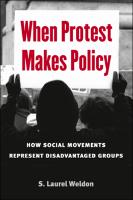When Protest Makes Policy
External Review of Whole Manuscript
How Social Movements Represent Disadvantaged Groups
| dc.contributor.author | Weldon, Sirje Laurel | |
| dc.date.accessioned | 2022-11-01T11:10:59Z | |
| dc.date.available | 2022-11-01T11:10:59Z | |
| dc.date.issued | 2012 | |
| dc.identifier | OCN: 792700044 | |
| dc.identifier.uri | https://library.oapen.org/handle/20.500.12657/59129 | |
| dc.description.abstract | A must-read for scholars across a broad sweep of disciplines. Laurel Weldon weaves together skillfully the theoretical strands of gender equality policy, intersectionality, social movements, and representation in a multimethod/level comparative study that unequivocally places women's movements at the center of our understanding of democracy and social change."" ---Amy G. Mazur, Washington State University "Laurel Weldon's When Protest Makes Policy expands and enriches our understanding of representation by stressing social movements as a primary avenue for the representation of marginalized groups. With powerful theory backed by persuasive analysis, it is a must-read for anyone interested in democracy and the representation of marginalized groups." ---Pamela Paxton, University of Texas at Austin ""This is a bold and exciting book. There are many fine scholars who look at women's movements, political theorists who make claims about democracy, and policy analysts who do longitudinal treatments or cross-sectional evaluations of various policies. I know of no one, aside from Weldon, who is comfortable with all three of these roles."" ---David Meyer, University of California, Irvine What role do social movements play in a democracy? Political theorist S. Laurel Weldon demonstrates that social movements provide a hitherto unrecognized form of democratic representation, and thus offer a significant potential for deepening democracy and overcoming social conflict. Through a series of case studies of movements conducted by women, women of color, and workers in the United States and other member nations of the Organisation for Economic Co-operation and Development (OECD), Weldon examines processes of representation at the local, state, and national levels. She concludes that, for systematically disadvantaged groups, social movements can be as important---sometimes more important---for the effective articulation of a group perspective as political parties, interest groups, or the physical presence of group members in legislatures. When Protest Makes Policy contributes to the emerging scholarship on civil society as well as the traditional scholarship on representation. It will be of interest to anyone concerned with advancing social cohesion and deepening democracy and inclusion as well as those concerned with advancing equality for women, ethnic and racial minorities, the working class, and poor people. S. Laurel Weldon is Professor of Political Science at Purdue University. | en_US |
| dc.language | English | en_US |
| dc.relation.ispartofseries | The Cawp Series In Gender And American Politics | en_US |
| dc.subject.classification | thema EDItEUR::J Society and Social Sciences::JP Politics and government | en_US |
| dc.subject.classification | thema EDItEUR::J Society and Social Sciences::JP Politics and government::JPW Political activism / Political engagement | en_US |
| dc.subject.classification | thema EDItEUR::J Society and Social Sciences::JB Society and culture: general::JBS Social groups, communities and identities::JBSF Gender studies, gender groups::JBSF1 Gender studies: women and girls | en_US |
| dc.subject.other | Social movements -- Political aspects.;Feminism -- Political aspects.;Social movements -- Political aspects -- United States.;Feminism -- United States | en_US |
| dc.title | When Protest Makes Policy | en_US |
| dc.title.alternative | How Social Movements Represent Disadvantaged Groups | en_US |
| dc.type | book | |
| oapen.identifier.doi | 10.3998/mpub.1285595 | en_US |
| oapen.relation.isPublishedBy | e07ce9b5-7a46-4096-8f0c-bc1920e3d889 | en_US |
| oapen.relation.isFundedBy | b818ba9d-2dd9-4fd7-a364-7f305aef7ee9 | en_US |
| oapen.relation.isbn | 9780472117482 | en_US |
| oapen.relation.isbn | 9780472035113 | en_US |
| oapen.relation.isbn | 9780472026371 | en_US |
| oapen.collection | Knowledge Unlatched (KU) | en_US |
| oapen.pages | 243 | en_US |
| peerreview.anonymity | Double-anonymised | |
| peerreview.id | d98bf225-990a-4ac4-acf4-fd7bf0dfb00c | |
| peerreview.open.review | No | |
| peerreview.publish.responsibility | Scientific or Editorial Board | |
| peerreview.review.decision | Yes | |
| peerreview.review.stage | Pre-publication | |
| peerreview.review.type | Full text | |
| peerreview.reviewer.type | External peer reviewer | |
| peerreview.title | External Review of Whole Manuscript | |
| oapen.review.comments | The proposal was selected by the acquisitions editor who invited a full manuscript. The full manuscript was reviewed by two external readers using a double-blind process. Based on the acquisitions editor recommendation, the external reviews, and their own analysis, the Executive Committee (Editorial Board) of U-M Press approved the project for publication. |

